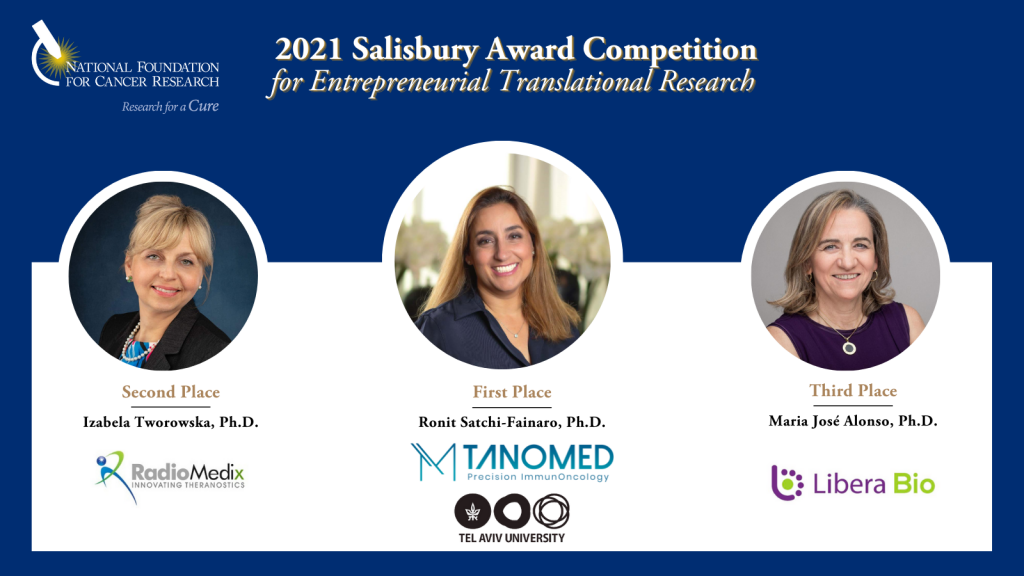Founded by Professor Alonso, Libera Bio is a company developing a novel delivery vector of whole monoclonal antibodies to intracellular cancer targets otherwise deemed “undruggable”
The Salisbury Award Competition is designed to catalyze and advance promising cancer research innovations onto a path of commercialization and patient impact
Santiago de Compostela, 26 May 2021.- The US National Foundation for Cancer Research (NFCR) announced this week the winners of the 2021 Salisbury Award Competition for Entrepreneurial Translational Research. The cancer-battling innovation presented by Maria José Alonso, Professor of Biopharmaceutics and Pharmaceutical Technology at the University of Santiago de Compostela (USC) and founder of Libera Bio, a Spain-based company developing a novel delivery vector of whole monoclonal antibodies to intracellular cancer targets otherwise deemed “undruggable”, was awarded with the third prize.
The Salisbury Award program was established in 2019 in honor of three family members whose shared vision and legacy have defined NFCR’s mission and continue to guide the organization’s commitment to funding “high-risk, high-impact and high-reward” cancer research. The Salisbury Award Competition is designed to identify and promote innovative discoveries made in the lab to be commercialized, with the ultimate goal of benefiting cancer patients. Innovations are assessed by the event’s judging committee based on categories of feasibility, novelty and cancer patient impact.
2021 winners
In this edition, the first prize winner of the Salisbury Award Competition was the cancer therapeutic innovation presented by Ronit Satchi-Fainaro, Ph.D., co-founder and chief scientific officer (CSO) of Israel-based TanoMed, and a professor at Tel Aviv University and director of its Cancer Biology Research Center. Their technology trains host immunity in the tumor microenvironment against a specific member of the carcinoembryonic antigen-related cell adhesion molecule family, CEACAM5, that plays a prominent role in gastrointestinal cancers.
The second prize went to the innovation presented by Izabela Tworowska, Ph.D., co-founder and CSO of Houston-based RadioMedix, a company advancing a peptide receptor radionuclide experimental therapy that targets certain inoperable neuroendocrine tumors.
The 2021 winners were selected from among eight semi-finalists after pitch presentations in front of a judging committee consisting of prominent cancer research scientists, clinicians, early-stage investors and business leaders. The semi-finalists were determined earlier in the spring based upon applications from among academic laboratories or early-stage companies advancing promising experimental cancer therapeutic, diagnostic, detection and vaccine innovations.
2021 Salisbury Award Competition
“The Salisbury Award Competition has significantly grown in its scope, impact and breadth of technologies since the program’s creation only two years ago”, said NFCR President and CEO Sujuan Ba, Ph.D. “The 2021 event featured an exceptional set of translational cancer research projects and innovations being developed by labs and start-ups—each of which holds much promise for real impact”.
“Translational research, at its core, is the critical juncture where promising laboratory findings can become clinically significant technologies,” stated Dr. Cavenee, chair of NFCR’s scientific advisory board. “The Salisbury program has become well-respected and global in its reach—as is the cancer problem. This is underscored by three of the top four awarded oncology innovations this year—including the winner’s—being invented outside the US”.
About the US National Foundation for Cancer Research
The National Foundation for Cancer Research (NFCR) is a non-profit organization that provides scientists critically needed funding to make cutting-edge discoveries in cancer treatment, detection, prevention and, ultimately, a cure. NFCR has distinguished itself by supporting high-risk, high-impact and transformative research often overlooked by other major funding sources that deem it too risky. Since its establishment in 1973, NFCR has provided more than $390 million for cancer research and public education.
